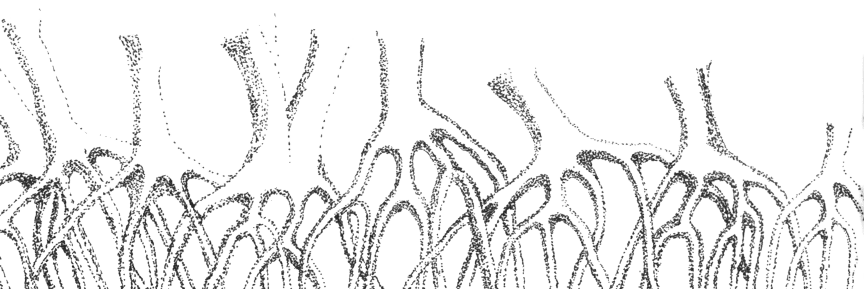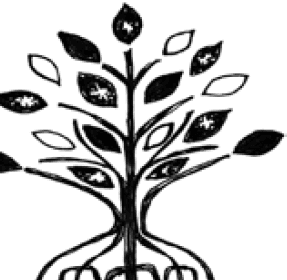Memories of a Dead Season
(For my brothers, Bien and Morgan)
An Llego
SCHOOL IS OUT; THE SEASON OF DRY WINDS HAS COME. Out in our backyard, the land slopes down to a pond where my brother would catch mudfish and catfish as large as or even larger than my thighs with his bare hands. The slope used to be a dike of what was once a fishpond. Years of monsoon rains washed alluvial soil down the side of the dike, gentling it to a slope. The dike is now grown over with sweet carabao grass.
I lie on my back, looking at the sky. The broad blades of grass tickle where my arms are bare. I slip my arms off the sleeves of my brother’s shirt and press them close to my body, though there’s enough room for them inside the shirt. I am skinny. My mother often gives me food off her plate so I have more to eat but remain skinny. My brother is not skinny. He’s strong. He has muscles that bunch up his arm when he makes a fist and draws it up close to his shoulder.
The sky is very blue. So blue it throbs. I can almost hear the sound it makes, a low thumping sound very much like my brother’s heart. The wind is blowing. It is a good wind for flying kites. My brother told me it comes all the way from the China Sea, blowing its way across the Central Plains to tell the farmers how dry the dead season will be and how high the waters are when the rains finally flood the land. My brother knows many things.
From the corner of my eye, I see the first kite fly out of the line of treetops. They’re flying kites out in the fields of Mama Abian. In the dry season, empty of rice, it is a flat open space of dried-out mud crisscrossed by the low dikes of the rice paddies. Often, thin snakes crawl out of the fissures of the dry mud, so the safest is to stay on the back of a carabao while flying kites.
We do not have a carabao; my brother has a bike. The only bike in the barrio is the object of envy among the neighborhood boys. Apit, who my brother taught to ride the bike, shares his carabao’s broad back with him while they fly kites. I perch on a branch of the old camachile tree, right where the trunk parted from a lightning strike.
I know that first kite. It is Apit’s, my brother’s best friend. It is made out of the newspaper his father asks from us, either to use in the outhouse or as wrappers for the smoked fish his wife peddles around the barrio. Following Apit’s kite is Doming’s, made of white papel de japon, light and thin, like a wisp of a cloud. Cirrus, my brother, told me. Those are very high clouds, he said. How do you know? I asked. It is in Papang’s books. That’s how my brother knows a lot. He reads our father’s books. We are forbidden to touch those books locked inside the narra cabinet with a glass front, but my brother knows how to open it with a key from a corned beef can. He can open many locks with that key. My brother knows many things.
Other kites join Apit’s, flying higher and higher as the boys play out their lines. Atong’s bright yellow kite is not flying. Neither is my brother’s red one. Perhaps Atong’s was never found. Apit once said that should Atong one day lose his kite, he’d look for it, claim it for his own and fly it. The kites fly peacefully. Perhaps no one wants to fight now.
There had always been kite fights. Atong likes to fight. He’d tangle up his kite string with another’s, tug at it until one would snap free, and a boy would lose his kite. Usually, it was not Atong’s. My brother lost several kites to him. Until yesterday.
Yesterday afternoon my brother came prepared to fight Atong at his own game. He knew what to do, and I helped him do it. When Atong’s kite snapped free, I was so happy I jumped down from where I perched and ran to my brother, shouting, It worked! It worked!
What worked? Atong asked, turning to me and then to my brother. The glass, I said. We stuck the ground glass on the kite string.
Atong moved swiftly like a snake coming out of the fissure of a hot, dry field. He pulled my brother off the carabao back and struck him several times in the abdomen. My brother fell to his knees, blood gushing in spurts between his fingers.
THEY HAVE TAKEN MY BROTHER TO THE CITY. That was yesterday. The city must be far. It must be near the China Sea, for until now, he and Mamang had not come back. Only Nana Sela, who helps with the housework, is here. The house feels so big. But all throughout the rooms, I hear my brother’s heart. Out in the batalan where Nana Sela does the laundry, I find my brother’s key in his soiled short pants. I place it in mine.
The sky is blue, very blue. So blue it thrums. It thrums like Tio Angelo’s jeep, which took my brother away. It has come back. Then a howling like the wild typhoon wind begins. It is Nana Sela. I hold the key tightly in my hand until it disappears in the pain of my palm.
I am not a farmer, not even the daughter of one, but I hear and understand the wind. The dead season is here.








